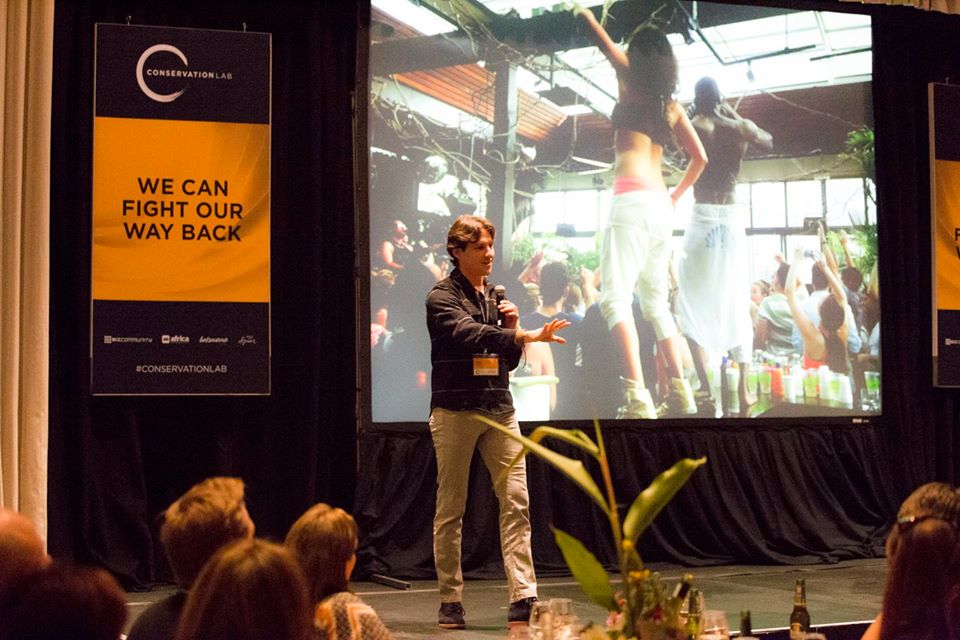WINNING THE CONSERVATION WAR
Gilad Goren, founder of Travel+SocialGood and one of the delegates at Conservation Lab 2016, tells us what he learned at this year’s un-conference when it comes to winning the conservation war in Africa.
The unfortunate byproduct of a well-worn passport is the risk of exposure to some of the more flagrant tragedies of our time. It may take shape as an overheard statistic — 30% of food grown around the world is squandered while 795 million go malnourished every day. Or it can be as visceral as the sight of a child rummaging through a trash bin only meters away from your outdoor café table. Our inherent ability to psychologically dissociate from the tragedies that surround us can be astounding.
But don’t give up on me yet. This is an optimistic article — please read on.
I was invited to attend and share ideas at the 2016 edition of Conservation Lab, a weekend-long unconference catalyzing conversations and, ideally, solutions for winning the war against the global poaching industry. At stake is nothing less than Africa’s hopes for sustainable development and a path out of poverty for millions. More on that in a bit.
The peaceful setting of Stellenbosch’s vineyard-laden hills provided an idyllic backdrop to the days’ sessions. Sobering conversations on the futility of the status-quo built up to an exchange of truths and best practices tested in the field, and the development of possible paths forward. The mix of conservation veterans, lodge owners, travel professionals, journalists and nonprofit leaders provided a veritable education on this crucial struggle. As a tribute to the attendees of the event, and the Beyond Luxury Media team who admirably convened and facilitated this crucial event pro bono, the following is a distillation of the lessons learned and a roadmap for solving the conservation crisis.

Why we’re losing the fight
Many factors account for the success or failure of the campaign to end poaching. Ending the demand, shutting down the supply chain, and incentivizing hunters with economic alternatives are only a few of the goals to be fulfilled in order to stem this senseless eradication. None of this can be achieved as long as conservation efforts are kept fragmented and weak. The glut of initiatives fighting the same fight independently of each other is astounding. Instead of sharing resources as a united front, constant competition for donor funding and wasteful overlap in administration overhead ensues. As one of the attendees at the event summarized, all industries have a natural desire to sustain their existence and proliferate, even those whose aim is to work themselves out of a job.
Travel has a fundamental role to play in winning the war
At nearly ten percent of global GDP and employing one in every eleven individuals, the travel industry impacts every single living being on earth. In the developing world, tourism is seen as a chief economic strategy for sustainable growth and development. It generates infrastructure development, offers a solid platform for upward mobility, and has the unique potential for transforming every stakeholder involved for the better.
The primary motivation for leisure travel to Africa has always been for its wildlife. The animals suffering extermination are also the very foundation for international leisure travel to the continent. Tourism already provides one in every twenty jobs in Sub-Saharan Africa, and is projected to grow at a steady pace of four to six percent per year. This progress will grind to a halt without Africa’s wildlife alive to draw in tourists. And so with both the financial incentive and the risk clearly in place, tourism must play a meaningful role in the conservation efforts.
The tragedy of wasted good will
As tourism grows, so does a cottage industry of philanthropy efforts steered by the travel outfits that make it up. Whether as an expression of global citizenship, a keen sense for marketing cache, or simply first-world guilt, travel philanthropy has become an expected norm. CSR reports feature heavily on websites and marketing collateral. Project visits have become a standard highlight in trip itineraries.
And while this is indeed a step forward in the right direction, it is outweighed by the missed potential that the world’s largest industry has for global good. Without a comprehensive and united approach to travel-philanthropy, the issues we aim to ameliorate, such as conservation and rising inequality, are destined to slip through the cracks of good intentions.
Common among conservationists from throughout Sub-Saharan Africa is their frustration with this immense missed opportunity. The current landscape of status-quo travel philanthropy provides a fragmented web of funding, often provided in irregular and unreliable fits and with harmful restrictions. You can’t provide a Formula 1 racer the vehicle of their choice, but with only a quarter of the fuel needed, and expect them to win the race.
The travel philanthropy cottage industry must end
As someone who spent years as a tour operator, launched a nonprofit organization and now a travel-tech startup, I know firsthand how ego and a false sense of confidence can blind one to realities in the field. We must put both in check if we truly want to play our role in ending the conservation crisis. This means catalyzing good intentions into a united and effective front. It means adoption of a transparent donation framework with a direct link between tourism dollars and contributions. An industry-wide fund will need to replace the sea of disparate initiatives, and include an endowment guaranteeing funding even during turbulent times in the continent, such as when terrorist or epidemic scares lead to weak tourism seasons. And of course, it means allowing the experts to decide how best to use the resources needed for fighting the criminals who massacre animals for parts, and the multi-national crime syndicates that fund them. If we can achieve this, we will be able to win this war.
I promised optimism, and here it is. I discovered that there is certainly light at the end of this tunnel. We know what is needed in order to guarantee the future we wish to live in. Conservation Lab, this vital gathering facilitated by the Beyond Luxury Media team, has provided the platform for us to achieve a shared understanding of what must be done, and how tourism can serve as the catalyst for achieving it. Now is the time to fix our torches and start marching towards the light, together.
Gilad is the founder of Travel+SocialGood, a global nonprofit organization focused on transforming the world’s largest industry to meet its potential for positive impact on a global scale. He is also the founder of Only Six Degrees, an impact consultancy that builds the impact identity of brands in the travel space, and positions them as successful case studies of how to do well by doing good. He currently lives in New York City, teaching on Sustainable Tourism at New York University.
